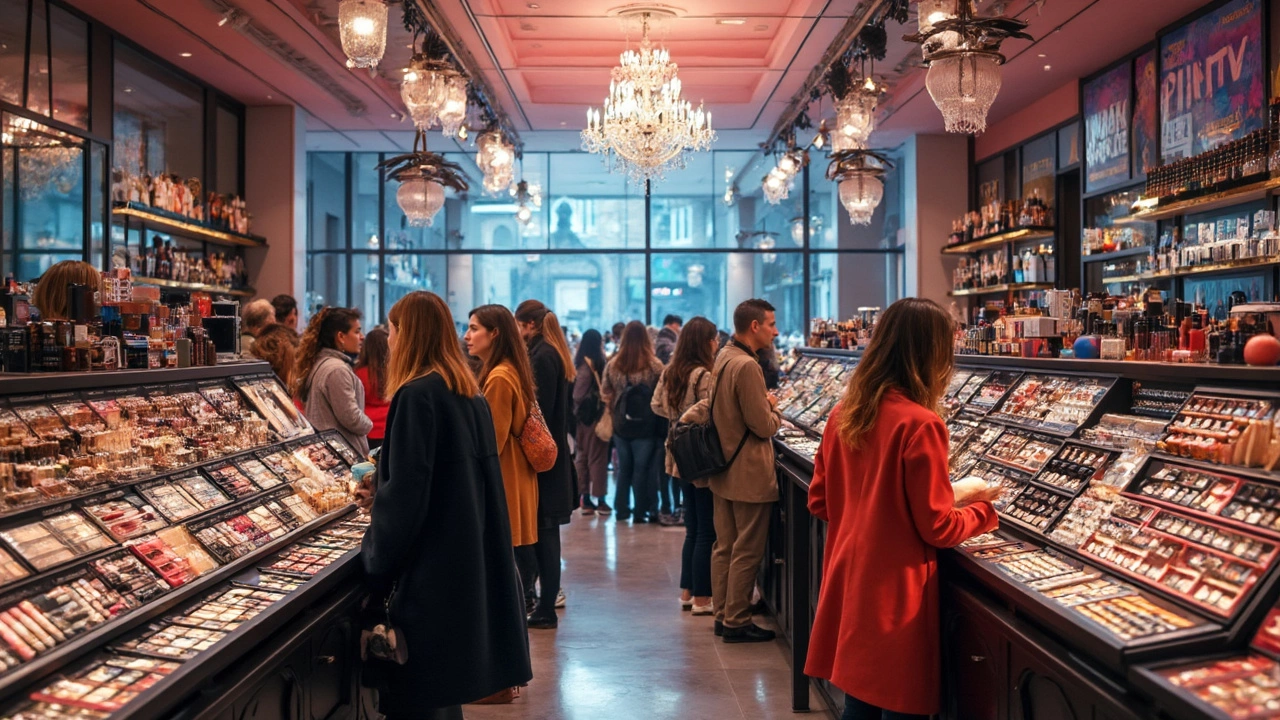So, you're wondering if NYX, that favorite makeup brand of many, still test on animals? As of now, the answer is a comforting no. NYX has established itself as a cruelty-free brand, meaning they don't test their products on animals anywhere in the world. Pretty cool, right? But what’s exactly behind the term 'cruelty-free'?
When a product is labeled cruelty-free, it means that no animal testing has been involved at any stage of the product's development. This is becoming a big deal in the makeup world, as more and more consumers are choosing ethical options.
NYX is certified by PETA, an organization that provides assurance that their cruelty-free claims aren't just a marketing ploy. This certification is essential because it adds an extra layer of trust, knowing that an esteemed organization has vetted their practices.
- The Meaning of Cruelty-Free
- NYX's Official Stance
- Certification and Assurance
- The Impact on the Beauty Industry
- Identifying Cruelty-Free Brands
- Consumer Tips and Considerations
The Meaning of Cruelty-Free
The term 'cruelty-free' in the world of beauty can be a bit confusing, can't it? It generally means that the product and its ingredients weren't tested on animals. This is a key concern for many makeup lovers today who want to make ethical shopping choices.
NYX is among those brands proudly receiving this label. But, how does a brand actually earn that 'cruelty-free' tag?
Certification and Standards
Certification from respected organizations, like PETA or Leaping Bunny, is crucial. These groups set standards and conduct checks to ensure no animal testing is used at any phase of production. They're like the animal-friendly watchdogs of the beauty world.
There's also a say on cosmetic laws. While the European Union banned animal testing for cosmetics in 2013, not all countries have the same regulations. So, a product being sold globally might still vary by region.
Why Does It Matter?
Knowing a brand is cruelty-free gives peace of mind and is a step towards more responsible consumption. It encourages companies to innovate without resorting to outdated practices. Did you know that more than half of consumers now consider a brand's animal testing policy when making a purchase?
Want a quick tip? Always look for certifications on packaging as a first clue that the brand has met cruelty-free standards. Better yet, dig a little deeper by checking for reputable online beauty communities or databases that list approved brands.
NYX's Official Stance
When it comes to NYX and animal testing, the company's position is crystal clear—they don't do it. This isn't just a claim they throw around lightly; they've backed it up with certifications from organizations like PETA and the global Leaping Bunny program. These certifications mean they've agreed to uphold strict guidelines against animal testing for their products, both locally and abroad.
Certifications Matter
To many in the cruelty-free makeup community, a certification is more than just a fancy seal. It's a promise that each lipstick, eyeshadow, or concealer is produced with ethical standards in mind. NYX displays these certifications prominently to assure customers of their commitment. It's like a badge of honor in the beauty industry.
Behind the Label
For NYX, being compliant with cruelty-free guidelines also means ensuring that their suppliers are on the same page. This adds another layer of complexity, but it speaks to their dedication. It’s not just about the end product; every ingredient is checked to maintain their cruelty-free promise.
One interesting tidbit? NYX has expanded into countries like China without falling into the mandatory animal testing trap usually required there. How do they swing it? By only selling their products via channels that don't mandate such testing. Smart move!
For makeup lovers who care about ethical practices, it’s reassuring to know that these bold claims are monitored and verified. So, when you pick up that NYX blush, you know you’re supporting a brand walking the ethical walk.
Certification and Assurance
Ever wondered what those stamps and logos actually mean when checking if makeup brands like NYX are truly cruelty-free? Let’s break it down. Having a certification is more than just a fancy label—it's a promise that your favorite beauty products align with certain ethical standards.
NYX is backed by PETA’s Beauty Without Bunnies program, one of the most trusted certifications in the beauty industry. This endorsement tells consumers that NYX adheres to PETA’s cruelty-free standards, ensuring that no animal testing is involved at any part of their manufacturing process, nor do they commission third parties to do so. This assurance provides peace of mind for animal lovers and ethical shoppers alike.
Spotting Genuine Certifications
Not all certifications are created equal. The key is knowing which ones to trust. Apart from PETA’s program, other reputable certifying bodies include Leaping Bunny and Choose Cruelty-Free. These organizations usually conduct rigorous evaluations before granting their seal of approval.
- Leaping Bunny requires brands to comply with a strict no animal testing policy, including independent checks and company supply chain audits.
- Choose Cruelty-Free from Australia goes even beyond cosmetics, ensuring entire companies do not engage in animal testing.
Look for these logos on products. They act as a quick and reliable guide to cruelty-free shopping. This little bit of extra scrutiny helps protect animal welfare while supporting brands that align with your values.
Feeling empowered about your cruelty-free choices? It’s pretty amazing how certification and assurance transform your shopping into a responsible act!

The Impact on the Beauty Industry
Cruelty-free beauty is more than a trend; it's a whole movement reshaping how the industry operates. With NYX and other brands committing to it, there's a ripple effect impacting consumers and companies alike.
First up, brand reputation. More consumers are making choices based on ethics. Brands known for being cruelty-free tend to foster stronger loyalty and customer base trust. People love knowing their makeup aligns with their personal values.
Let's talk money. The cruelty-free market is booming. According to a 2023 market analysis, the cruelty-free cosmetics market is projected to hit a whopping $10 billion globally by 2026. Brands like NYX that are already in the game have a strong foothold in this lucrative market.
Increased Transparency
Companies are becoming more transparent about their processes. One result is clearer labeling and third-party certifications, like cruelty-free bunnies on packaging, that make consumer choices easier and more informed.
Innovation Boost
This movement is also sparking innovation. Companies are investing in alternative testing methods, like cell cultures and computer modeling, which might have seemed like sci-fi a decade ago. These methods not only spare animals but can also be more cost-effective in the long run.
Encouraging Legislation
Legislation is slowly catching up. Many regions, even entire countries, are placing bans on animal testing. The EU, for instance, has been leading the charge, banning all animal testing on cosmetics since 2013.
Ultimately, as the demand for cruelty-free products continues to rise, the beauty industry is pivoting to meet these consumer preferences. What once seemed fringe is now mainstream, with brands large and small reassessing their policies and practices.
NYX is just one piece of this puzzle, but their commitment speaks volumes about where the beauty industry is heading.
Identifying Cruelty-Free Brands
Shopping for products that don’t harm animals can feel like navigating a never-ending maze. But with some know-how, you can become a pro at picking truly cruelty-free options. Let's break it down.
Look for Certifications
The quickest way to determine if a brand is cruelty-free is by checking for certifications. Keep an eye out for logos from PETA, Leaping Bunny, or Choose Cruelty-Free. These organizations have rigorous standards, ensuring the brands they certify don’t engage in animal testing at any level.
Read Up on Parent Companies
Here's a twist: even if a brand is certified cruelty-free, their parent company might not be. Some consumers feel comfortable buying from such brands, while others don’t. It’s about personal preference, so decide what aligns with your values.
Check the Company’s Website
Brands usually address their animal testing policy in the FAQ or About Us section. If a company is truly cruelty-free, they’re likely shouting it from the rooftops. If they’re vague or noncommittal, it’s okay to be cautious.
Use Trusted Resources
There are lists and apps designed specifically for cruelty-free makeup shoppers. Resources like Logical Harmony and Cruelty-Free Kitty update their lists frequently and provide in-depth brand analyses.
Be Wary of Misleading Claims
A label that says “Not Tested on Animals” isn’t necessarily cruelty-free. Companies can legally make this claim even if animal testing was performed by suppliers or regulatory bodies. Stick to brands with recognized certifications.
Arming yourself with this knowledge not only helps animals, but also supports companies pushing for a kinder industry. Need some quick facts to back it up?
| Organization | Certifications Issued |
|---|---|
| PETA | 2,500+ |
| Leaping Bunny | 1,000+ |
| Choose Cruelty-Free | 300+ |
Remember, even a small change in your purchasing behavior can make a big impact over time!
Consumer Tips and Considerations
When shopping for cruelty-free makeup, like NYX, there are a few handy tips to keep in mind to ensure you're truly supporting ethical practices. First off, always look for credible certifications on product packaging. A logo from Leaping Bunny or PETA is a good indicator that the brand aligns with cruelty-free standards.
Check the Company’s Policy
It’s useful to go beyond the label. Visit the brand's website and read their animal testing policy. Brands like NYX are usually transparent, having a dedicated section clarifying their stance on animal testing.
Know Where the Brand Sells
This can be a bit tricky since some countries require animal testing by law. For example, if a brand sells in China, they might not be cruelty-free. Always check their distribution policies!
Look for Alternative Options
Even within a brand that claims to be ethical, some products might not meet your personal standards. Having a list of alternative brands handy can save the day. Other popular cruelty-free brands to consider include e.l.f. Cosmetics and Urban Decay.
Be Skeptical of Misleading Claims
Terms like 'Not Tested on Animals' without third-party certification can be misleading. It's worth digging a little deeper to validate these claims.
Here's a quick list to keep in mind while shopping:
- Look for reliable certifications.
- Verify animal testing policies.
- Check global selling practices.
- Have a list of backup brands.
- Beware of vague labeling.
Being a mindful consumer involves a bit of effort, but it definitely pays off. Supporting brands like NYX who prioritize ethical practices encourages a shift in the industry and promotes a much-needed change towards kinder beauty standards.
